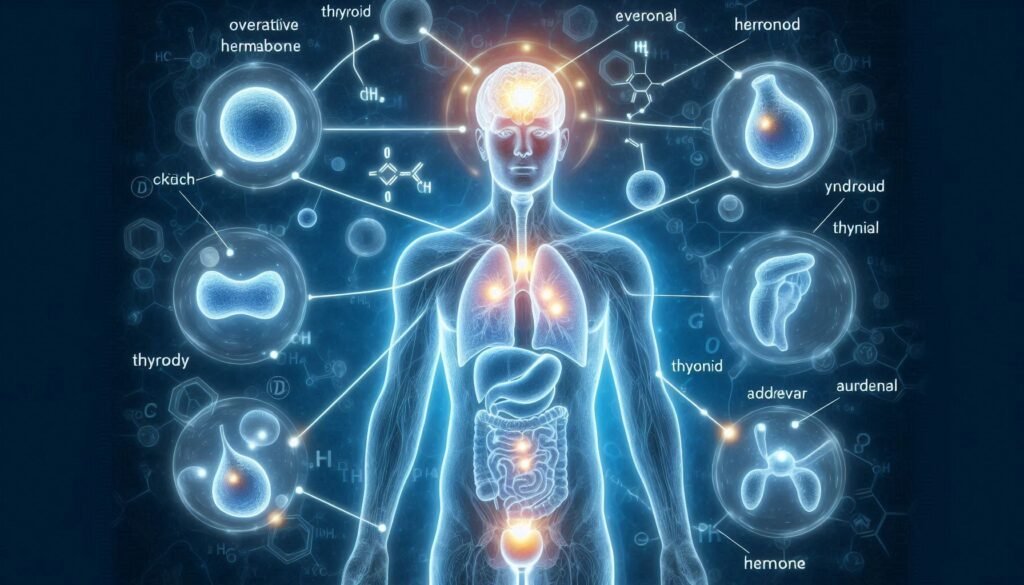Hormonal imbalances can have far-reaching effects on our health, influencing everything from mood to physical well-being. One particularly intriguing area of study is the connection between these hormonal fluctuations and catatonia—a state marked by altered mental status and motor function. As researchers delve deeper into this complex relationship, it becomes clear that understanding how hormonal shifts impact catatonic symptoms could revolutionize treatment approaches.
Catatonia often presents in various psychiatric disorders but may also arise due to physiological factors, including those stemming from the endocrine system. Grasping the nuances of this interplay not only sheds light on a puzzling condition but also opens doors for more effective interventions. Join us as we explore how different hormones contribute to catatonic states and what implications they hold for diagnosis and therapy.

The Endocrine System’s Role in Catatonic States
The endocrine system is a complex network of glands that produce hormones, playing a critical role in regulating various bodily functions. Its influence extends to mood, stress response, and overall mental health. Disruptions within this system can lead to significant changes in behavior and cognition.
Research suggests that imbalances in key hormones may contribute directly to catatonic states. These alterations can arise from conditions like thyroid dysfunction or adrenal gland issues. Each hormonal disruption affects neurotransmitter systems, which are vital for maintaining stable emotional and cognitive function.
Furthermore, the relationship between hormones and brain activity is intricate. Hormones such as cortisol impact how we respond to stressors; elevated levels might predispose individuals to catatonia during overwhelming situations. Likewise, fluctuations in sex hormones have been linked with psychiatric symptoms.
Understanding these connections provides valuable insights into why certain individuals develop catatonic features under specific circumstances. This knowledge paves the way for targeted interventions addressing both hormonal health and mental well-being.
Thyroid Hormone Imbalances and Catatonia
Thyroid hormone imbalances play a significant role in various mental health conditions, including catatonia. The thyroid gland regulates metabolism and energy levels through hormones like thyroxine (T4) and triiodothyronine (T3). When these hormones are out of balance, they can profoundly affect mood and behavior.
Hypothyroidism, characterized by low T3 and T4 levels, may lead to symptoms such as fatigue, depression, and even psychomotor retardation. These manifestations can resemble catatonic states where individuals exhibit decreased responsiveness or abnormal motor activity.
Conversely, hyperthyroidism results from excessive hormone production. This condition can cause irritability, anxiety, and restlessness—factors that might trigger or exacerbate catatonic episodes in susceptible individuals.
Research indicates that both underactive and overactive thyroid functions must be assessed when diagnosing catatonia. Addressing these hormonal imbalances could potentially alleviate some of the debilitating symptoms associated with this complex disorder.
Cortisol Dysregulation in Catatonic Presentations
Cortisol, the body’s primary stress hormone, plays a crucial role in regulating various bodily functions. Dysregulation of cortisol levels can significantly impact mental health. In catatonic presentations, abnormal cortisol patterns often emerge, suggesting a link between stress responses and motor activity.
Research indicates that individuals experiencing chronic stress may have elevated cortisol levels. This condition can lead to physical symptoms like fatigue and cognitive impairments. In severe cases, it may manifest as catatonia—a state characterized by immobility or extreme agitation.
Moreover, fluctuations in cortisol can affect neurotransmitter systems involved in mood regulation. When these systems are disrupted, they contribute to the onset of catatonic features. The relationship between high cortisol levels and anxiety also underscores this connection.
Understanding how cortisol dysregulation influences catatonia is vital for developing effective treatment strategies. Addressing hormonal imbalances could pave the way for better management of patients exhibiting such debilitating symptoms.
Sex Hormones and Their Impact on Catatonic Symptoms
Sex hormones, particularly estrogen and testosterone, play a crucial role in regulating mood and behavior. Fluctuations in these hormones can significantly impact mental health, potentially leading to catatonic symptoms. For instance, during hormonal changes such as menopause or puberty, individuals may experience heightened emotional instability.
Estrogen has been linked to various neurological functions. Low levels of this hormone can contribute to depressive states that might manifest as catatonia. Similarly, testosterone is known for its influence on aggression and motivation. Insufficient testosterone levels may lead to apathy or withdrawal—both common features observed in catatonia.
Research shows that hormonal imbalances often co-occur with psychiatric disorders like schizophrenia and bipolar disorder, both of which can present with catatonic features. Understanding the relationship between sex hormones and these conditions could pave the way for targeted therapies.
Monitoring hormonal levels in patients displaying catatonic symptoms could provide valuable insights into their treatment plans. A holistic approach addressing both psychological and physiological aspects is essential for effective management.
Growth Hormone Abnormalities and Catatonia
Growth hormone (GH) plays a crucial role in various bodily functions, including metabolism and mental health. Abnormalities in GH levels can lead to a range of psychological symptoms, potentially influencing catatonic states. Research has suggested that altered growth hormone secretion may be linked with mood disorders and psychotic conditions.
In individuals experiencing catatonia, fluctuations in growth hormone could exacerbate symptoms like immobility or stupor. Some studies indicate that low GH levels might correlate with increased severity of psychiatric presentations. This connection highlights the importance of monitoring hormonal levels when diagnosing these complex conditions.
Moreover, growth hormone abnormalities can affect neurotransmitter systems critical for regulating mood and behavior. The interaction between GH and other hormones creates a delicate balance necessary for optimal brain function.
Further investigation is needed to understand how treating GH deficiencies might alleviate catatonic symptoms. Exploring this relationship could open new pathways for effective management strategies in affected individuals.
Prolactin’s Influence on Catatonic States
Prolactin, a hormone primarily associated with lactation and reproductive functions, is gaining attention for its potential role in catatonic states. Elevated prolactin levels can impact mood and behavior, contributing to the onset of catatonia. This condition is characterized by motor dysfunctions that may manifest as immobility or excessive movement.
Research suggests that hyperprolactinemia could influence neurotransmitter systems linked to psychomotor activity. High levels of prolactin might disrupt dopamine pathways, which are crucial for regulating voluntary movements and emotional responses. Such disruptions can lead to significant behavioral changes often observed in catatonic patients.
Moreover, some medications aimed at treating psychiatric disorders increase prolactin secretion as a side effect. This raises questions about whether these treatments inadvertently exacerbate catatonic symptoms in susceptible individuals.
Understanding the relationship between prolactin and catatonia opens new avenues for research into effective treatment strategies that address hormonal imbalances while managing mental health conditions more holistically.
Vasopressin and Oxytocin: Lesser-Known Hormonal Factors
Vasopressin and oxytocin are often overshadowed by more prominent hormones like cortisol or thyroid hormones. Yet, their roles in emotional regulation and social behavior can significantly influence catatonic states. Vasopressin is primarily known for its role in water retention but also impacts mood and stress responses.
Research highlights that vasopressin levels may increase during stressful situations, potentially contributing to anxiety and agitation seen in some catatonic presentations. This elevation could create a feedback loop, exacerbating existing symptoms of catatonia.
Oxytocin, commonly referred to as the “love hormone,” plays a crucial role in social bonding and attachment. Low levels of oxytocin have been linked to various psychiatric disorders, including schizophrenia—often associated with catatonia.
Emerging studies suggest that both vasopressin and oxytocin might be involved in the neurobiological underpinnings of catatonia. Understanding these lesser-known hormonal factors could pave the way for innovative treatment approaches targeting such imbalances.
Diagnosing Hormonal Causes of Catatonia
Diagnosing hormonal causes of catatonia requires a thorough evaluation by healthcare professionals. A detailed medical history and physical examination are essential first steps. Clinicians often look for signs of underlying endocrine disorders that could be contributing to the patient’s symptoms.
Blood tests play a critical role in this diagnostic process. They can measure levels of various hormones, including thyroid hormones, cortisol, and sex hormones. Abnormalities in these hormone levels may indicate imbalances influencing catatonic states.
Additionally, mental health assessments help distinguish between primary psychiatric conditions and those influenced by hormonal factors. Often, patients may exhibit overlapping symptoms that complicate diagnosis.
The interplay between psychological and physiological aspects makes it vital to consider both realms during assessment. Collaboration among endocrinologists, psychiatrists, and primary care providers is crucial for accurate diagnosis and effective treatment strategies tailored to individual needs.
Hormone Replacement Therapy in Catatonia Management
Hormone replacement therapy (HRT) has emerged as a promising avenue for managing catatonia, particularly when hormonal imbalances are identified. This therapeutic approach aims to restore normal hormone levels in individuals experiencing catatonic symptoms. By addressing these underlying hormonal factors, HRT could potentially alleviate the severity and frequency of episodes.
Research indicates that certain hormones may play critical roles in mood regulation and neurological function. For example, thyroid hormones have been linked to cognitive performance and emotional responsiveness. Restoring optimal thyroid levels through HRT might improve overall mental health outcomes for those with catatonia.
Moreover, sex hormones like estrogen and testosterone also warrant attention in this context. These hormones influence neurotransmitter systems significantly involved in mood disorders. Targeting sex hormone deficiencies might provide additional benefits beyond symptom relief.
As always, careful evaluation by healthcare professionals is essential before starting any therapy. Tailoring treatment plans can optimize patient outcomes while minimizing potential side effects associated with HRT in the management of catatonia.
Future Research Directions in Hormonal Catatonia
Future research into hormonal imbalances and their influence on catatonia is crucial. There are numerous avenues worth exploring that could enhance our understanding of this complex relationship.
First, large-scale studies focusing on the endocrine profiles of patients experiencing catatonic states can provide more comprehensive data. This will help establish clearer correlations between specific hormonal levels and the severity or presence of catatonia.
Additionally, investigating the mechanisms through which hormones interact with neurotransmitter systems may reveal new insights into treatment strategies. Understanding how these connections work offers potential for innovative therapies that target both hormonal balance and psychiatric symptoms.
There is also a need to explore gender differences in hormone-related catatonic presentations. Since sex hormones play a significant role in mood disorders, recognizing how these variances affect the manifestation of catatonia could lead to tailored interventions.
Integrating neuroimaging techniques with endocrinological assessments might uncover neural pathways influenced by hormonal changes during episodes of catatonia. Such multidisciplinary approaches will advance not only diagnostic criteria but also therapeutic options available for individuals affected by this challenging condition.
As research progresses, it holds promise for improving outcomes for those struggling with both hormonal imbalances and their impact on mental health conditions like catatonia.


